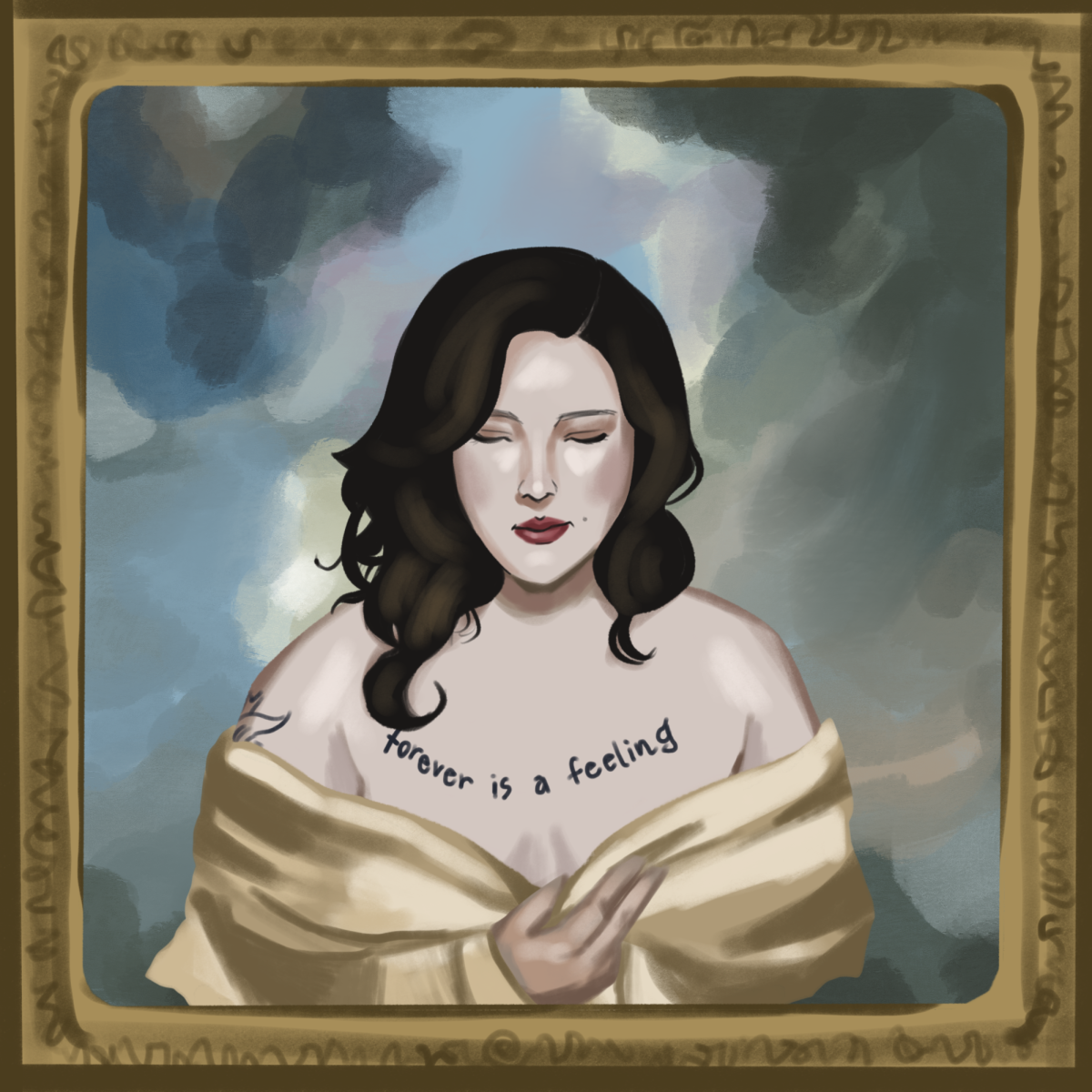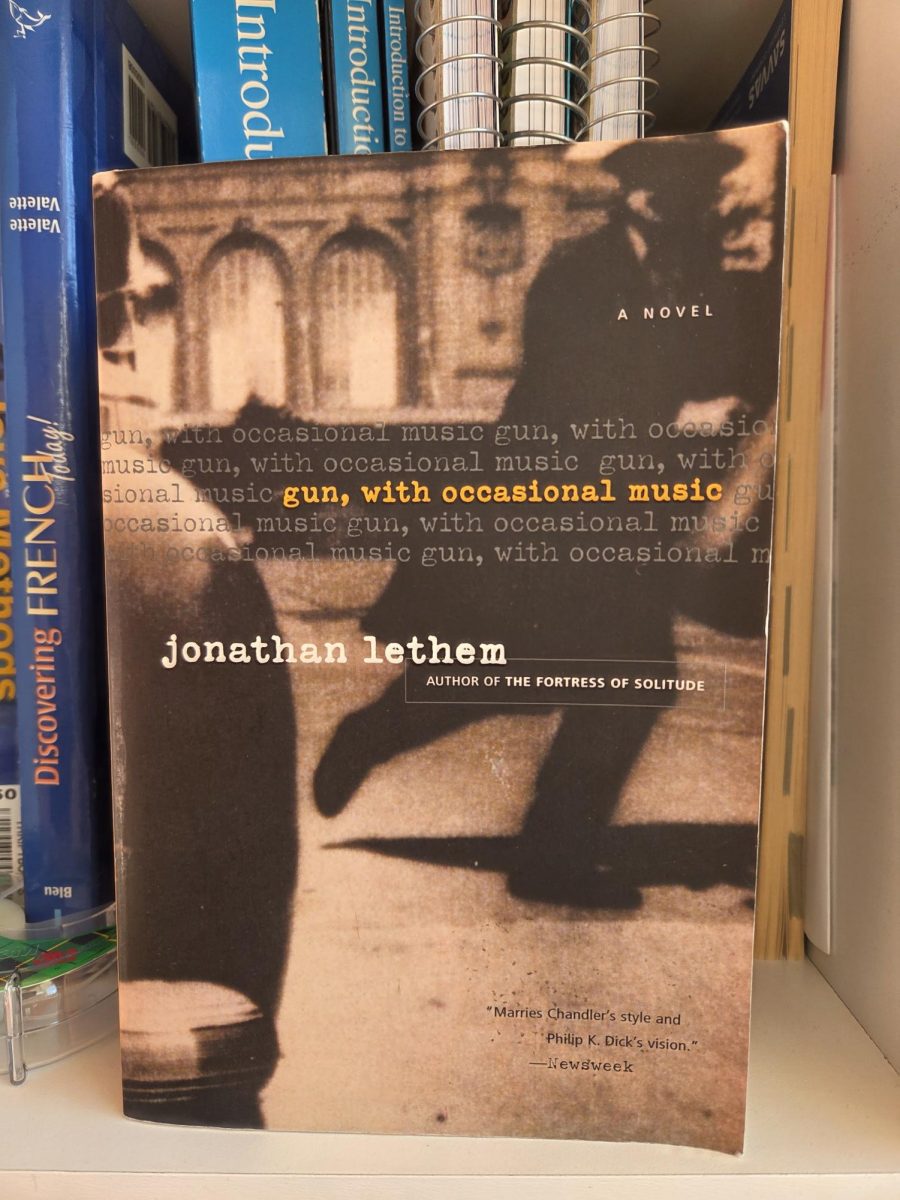Virginian songwriter Lucy Dacus’ latest album, “Forever Is A Feeling,” explores her budding queer relationship with music artist and collaborator Julien Baker. Although the introspective lyrics make this album a calming and thought-provoking piece of music, many of the songs sound too similar and the mind-numbing abundance and repetition of lyrics often overshadows the shallow instrumentals.
The album, released March 28, centers around all the different ways love manifests, from wonder to fear to lust. Through languid yet evocative lyrics and peaceful, mellow melodies, Dacus asserts her queerness as a part of her identity.
In the title track, “Forever Is A Feeling,” Dacus expresses her hope of forever being together with her partner, quipping, “My wrists are in your zip tie, 25 to life, why not?” With the casual remark, she dispels the stereotype that queer relationships are not meant to last or “just a phase.” The song also expresses how this relationship has changed Dacus, describing how before, she was no good at remembering details, yet now she sings, “But I remember everywhere we’ve ever been and when.” Although it’s a tad bit cheesy and cliché, I couldn’t help but feel giddy and warm while listening to these clearly lovey-dovey lyrics.
The album explores both Dacus’ past relationships from the lens of her current relationship and her past romances from a new perspective using sharply descriptive lyrics, interspacing them with soft guitar riffs or piano chords. However, I found one of the main shortcomings of this album to be the lack of cohesion between the lyrics and the melody. The songs sometimes blend together, indistinguishable in my mind with their similar subjects and a lack of musical variation.
“Best Guess” in particular disappointed me with the simplicity of the lyrics despite the grandiose declarations she invokes. Dacus constantly repeats the lines “You are / My best guess at the future / You are my best guess” without deviation. There is little conviction in such an absolute statement repeated so many times. Similarly, when she sings lyrics like “I’d lose my mind” in a mellow, even voice, she loses both credibility and my belief in the idea behind the song.
In other songs, some lyrics read like stream-of-consciousness thoughts with the music simply serving as a background. In “Limerence,” Dacus listlessly sings, “So bring on the parties, I wanna go dancing / My arm ‘round the waist of a friendly acquaintance.” It’s almost as if she is saying whatever pops into her head and rushing to fit all the words into the music, which lends a confusing and unpolished quality to the music.
Two of the most romantic love songs, “For Keeps” and “Lost Time,” with dreamy instrumentals and wistful, longing lyrics, start nearly the exact same way, with drawn out lyrics and almost identical guitar chords. Listening to these songs multiple times eventually helped me distinguish them, but the uniformity within the album was boring at first.
While some songs failed to capture my attention, one that stood out to me upon first listen was “Bullseye (with Hozier).” The beginning of the song is slightly confusing, with an immediate wordy description of their relationship, but the chorus where Dacus and Hozier’s voices intertwine and harmonize provides a welcome change. Along with incorporating a less complicated melody, Dacus condenses and simplifies the lyrics of this song, such as the straightforward and catchy chorus, “You’re a bullseye, and I aimed right / I’m a straight shot, you’re a grand prize.” Although Hozier’s voice blends well with Dacus’, his feature is not the only aspect that makes the song great; rather, the stylistic changes that Dacus makes help to immerse me within the music.
Songs that may seem sonically demure and mild often contradict their instrumentals through their subject matter. In “Ankles,” Dacus demands, “Pull me by the ankles to the edge of the bed / And take me like you do in your dreams.” These lyrics describing suggestive acts versus references to domestic gestures like doing the crossword together contrast each other, yet they are united by the constant cheerful guitar strums of the melody. I found the descriptions of the two aspects of the relationship to be satisfying, as both are essential components and the song does not just take a one-sided view of passion and love.
Mainstream music rarely represents queer contentment as mundane and prosaic rather than as political symbols or radical defiance. In “Lost Time,” Dacus recalls listening to her partner sing a song in the shower that she taught them years ago, bringing forth a charming memory of domesticity that fits well with the soft, almost bridal-sounding melody. The assertion that “I notice everything about you, I can’t help it,” in the same song also acknowledges how, historically, queer people feel the need to hide their love and stifle their feelings.
Despite some of the flaws in cohesion between subject matter and music, Dacus thoroughly explores love and domesticity in “Forever Is a Feeling,” affirming her relationship beautifully and without shame through her art.
Rating: 3.5/5
Favorite Songs: Forever Is a Feeling, Bullseye (with Hozier), Lost Time


















![“[Building nerf blasters] became this outlet of creativity for me that hasn't been matched by anything else. The process [of] making a build complete to your desire is such a painstakingly difficult process, but I've had to learn from [the skills needed from] soldering to proper painting. There's so many different options for everything, if you think about it, it exists. The best part is [that] if it doesn't exist, you can build it yourself," Ishaan Parate said.](https://harkeraquila.com/wp-content/uploads/2022/08/DSC_8149-900x604.jpg)




![“When I came into high school, I was ready to be a follower. But DECA was a game changer for me. It helped me overcome my fear of public speaking, and it's played such a major role in who I've become today. To be able to successfully lead a chapter of 150 students, an officer team and be one of the upperclassmen I once really admired is something I'm [really] proud of,” Anvitha Tummala ('21) said.](https://harkeraquila.com/wp-content/uploads/2021/07/Screen-Shot-2021-07-25-at-9.50.05-AM-900x594.png)







![“I think getting up in the morning and having a sense of purpose [is exciting]. I think without a certain amount of drive, life is kind of obsolete and mundane, and I think having that every single day is what makes each day unique and kind of makes life exciting,” Neymika Jain (12) said.](https://harkeraquila.com/wp-content/uploads/2017/06/Screen-Shot-2017-06-03-at-4.54.16-PM.png)








![“My slogan is ‘slow feet, don’t eat, and I’m hungry.’ You need to run fast to get where you are–you aren't going to get those championships if you aren't fast,” Angel Cervantes (12) said. “I want to do well in school on my tests and in track and win championships for my team. I live by that, [and] I can do that anywhere: in the classroom or on the field.”](https://harkeraquila.com/wp-content/uploads/2018/06/DSC5146-900x601.jpg)
![“[Volleyball has] taught me how to fall correctly, and another thing it taught is that you don’t have to be the best at something to be good at it. If you just hit the ball in a smart way, then it still scores points and you’re good at it. You could be a background player and still make a much bigger impact on the team than you would think,” Anya Gert (’20) said.](https://harkeraquila.com/wp-content/uploads/2020/06/AnnaGert_JinTuan_HoHPhotoEdited-600x900.jpeg)

![“I'm not nearly there yet, but [my confidence has] definitely been getting better since I was pretty shy and timid coming into Harker my freshman year. I know that there's a lot of people that are really confident in what they do, and I really admire them. Everyone's so driven and that has really pushed me to kind of try to find my own place in high school and be more confident,” Alyssa Huang (’20) said.](https://harkeraquila.com/wp-content/uploads/2020/06/AlyssaHuang_EmilyChen_HoHPhoto-900x749.jpeg)











